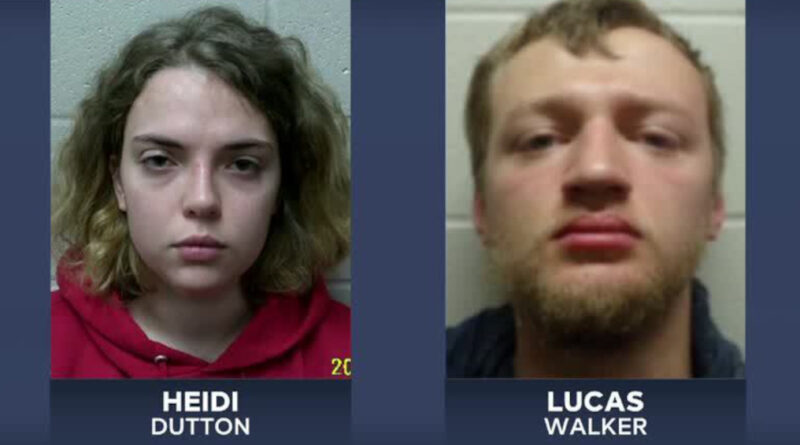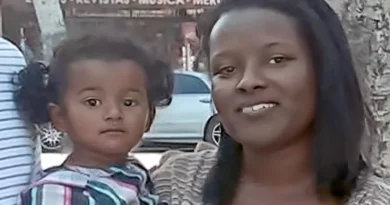Teen Heidi Dutton Murders Her Adopted Grandparents and Recruits Her Boyfriend Help in Dewey Oklahoma
Heidi Dutton was seventeen years old in late 2022 when she carried out one of the most shocking family homicides in recent Oklahoma history. Born in 2005, Heidi had been adopted as an infant by her grandparents, Deborah and Larry Dutton, and raised in the small rural community of Dewey. Friends and neighbors remembered her as a bright, ambitious teenager who participated in extracurricular activities and showed early leadership. Yet in the weeks leading up to December 2022, Heidi’s behavior had grown increasingly erratic, and she confided in classmates about feeling isolated within her own home. Psychologists later pointed to a tangled mix of adolescent unrest, emerging mental‐health struggles, and a controlling romantic relationship as precursors to the tragedy she would set in motion.
The Dutton Family and Their Home in Dewey
Deborah and Larry Dutton were pillars of the Dewey community. Deborah, 67, had served as an Air Force staff sergeant before becoming a professional chef, beloved for catering local fundraisers and church events. Larry, 73, retired as a Master Staff Sergeant in the Air Force and managed the nearby regional airport. Their modest farmhouse sat on two acres just outside town limits, surrounded by mature oaks and a white picket fence they had built by hand. Inside, family photographs lined the walls: Heidi as a toddler in her grandparents’ arms, Thanksgiving dinners with nieces and nephews, and milestone graduations. The home’s peaceful façade would soon be stained by blood, shattering the Duttons’ reputation for generosity and service.
Relationship Between Heidi Dutton and Lucas Walker
Central to the crime was Heidi’s relationship with twenty‐two‐year‐old Lucas Anthony Walker, a member of the Cherokee Nation. The pair met online in mid‐2022, and by autumn their bond had become intensely secretive. Lucas, several years older, asserted a guiding influence over Heidi’s actions; she later confessed that he encouraged her to distance herself from family and friends. Court records revealed that Lucas viewed Heidi’s grandparents as obstacles to their future together—financially and emotionally—and he began to plant seeds of violent intent. By December, the two had formalized a plan: Lucas would carry out the killings at Heidi’s behest, and she would assist with concealment.
The Night of December 19, 2022
Shortly before midnight on December 19, Heidi let Lucas into the Dutton home through an unlocked side door. Deborah and Larry, believing the noise was merely the family dog, remained in their bedroom. Lucas crept down the hallway with a stolen pistol; Heidi waited just outside the threshold. When Deborah opened the bedroom door to investigate, Lucas fired a single shot to her face and slit her throat. As Larry rose in alarm, Lucas attempted a second shot; the gun jammed. Frustrated, Lucas then repeatedly stabbed Larry in the chest and abdomen. From her vantage point in the hallway, Heidi watched in silence, later admitting under interrogation that she felt a “cold rush” at the moment the violence began.
Crime Scene and Method
After the murders, Heidi and Lucas wrapped the bodies in old bed sheets and loaded them onto a handcart stored in the garage. They wheeled the cart across the snow‐dusted back lawn, depositing the Duttons in a pair of shallow graves dug near a stand of pine trees. The entire sequence was captured on the home’s Ring security camera, though the footage was grainy in the darkness; investigators would later enhance the timestamps to confirm the timeline. Inside the bedroom, blood spatter radiated across the floorboards and ceiling, a telltale sign that the initial shots had struck from close range.
Discovery and Arrest
The Duttons’ absence was not noted until January 20, 2023, when Heidi failed to meet Deborah at a prearranged weekend brunch. A neighbor, concerned by accumulating newspaper delivery and a locked door with no lights on inside, requested a welfare check. Deputies arrived mid‐afternoon and found a door slightly ajar. They noticed dark stains seeping from under the bedroom floorboards and called in forensic teams. Within 48 hours, the makeshift graves were exhumed. Confronted with the evidence, both Heidi and Lucas confessed. Lucas was detained on federal charges as a Cherokee Nation member; Heidi was booked into the Washington County Juvenile Detention Center before being transferred to an adult facility once she turned eighteen.
Forensic Investigation
Forensic examiners pieced together the gruesome details through blood‐pattern analysis, ballistic testing, and digital timestamp verification. The pistol was recovered in a nearby creek, discarded in a plastic shopping bag. Autopsies confirmed cause of death: a single gunshot wound and throat laceration for Deborah, and multiple stab wounds for Larry. Toxicology reports showed neither victim had any substances in their system. Investigators reconstructed the timeline to within minutes: entry at approximately 11:47 PM, murders complete by 11:51 PM, burial by 12:30 AM. These precise details proved critical at trial, dispelling any argument that Heidi had played only a peripheral role.
Legal Proceedings
By spring 2025, Heidi had been charged with two counts of first‐degree murder, one count of conspiracy to commit murder, and two counts of desecration of a human corpse. Prosecutors recommended life imprisonment, emphasizing the premeditated nature of the crime and Heidi’s active involvement in planning and execution. Lucas Walker, tried separately at the federal level, pleaded guilty to two counts of second‐degree murder and received a 35‐year sentence under the Major Crimes Act. In May 2025, Heidi entered a guilty plea to avoid the death penalty; her sentencing hearing in June confirmed a life term with eligibility for parole only after serving 85 percent of a 45‐year minimum.
Victims’ Remembrances
In death, Deborah and Larry were remembered for their devotion to service and community. Friends recalled Deborah’s signature cinnamon rolls and the family’s annual Thanksgiving surplus dinners for those in need. Larry’s quiet generosity extended to giving plane rides to local children learning about aviation. At a joint memorial in Dewey’s town hall, the couple’s former church filled to capacity. Attendees spoke not of vengeance but of gratitude for the Duttons’ decades of kindness. A scholarship fund in their name was established at the local high school to support students pursuing culinary or aviation careers.
Motive and Psychological Factors
Psychologists called Heidi’s case atypical yet instructive. The combination of adolescent rebellion, deep attachment to an older partner, and untreated mental‐health issues created a perilous dynamic. Heidi confessed that she felt trapped by her grandparents’ expectations and that Lucas had promised freedom and a new life together. Court testimony revealed emails and text messages in which Heidi sought Lucas’s approval after minor disputes with Deborah and Larry. Experts highlighted how digital communication can amplify vulnerability in adolescence, especially when coupled with isolation and persuasive manipulation.
Community Reaction
Dewey’s tight‐knit populace was stunned. For weeks, neighbors reported sleepless nights, fearing a predator on the loose; relief came only after arrests. Local businesses displayed “Thinking of the Dutton Family” signs, and a vigil drew hundreds holding candles beneath the town’s water tower. Yet alongside sorrow there emerged conversations about mental‐health resources, gun safety, and the pressures teenagers face in rural towns. County commissioners pledged funding for a crisis‐intervention center, and the local school district expanded counseling services, hoping to prevent another tragedy born of silence.
Aftermath and Sentence
Heidi’s sentencing in June 2025 closed one chapter of grief while opening another of accountability. In court, she expressed remorse but offered little explanation beyond “I wanted them dead,” a phrase that haunted the gallery. The judge described the crime as “an unforgivable betrayal,” ordering that Heidi serve a minimum of 38 years before seeking parole. Lucas Walker’s sentence began immediately upon his guilty plea, ensuring that both conspirators would spend decades confined. Scholarly articles since have cited the case in studies of juvenile homicide, digital-era manipulation, and the interplay of family dynamics in violent crime.
Broader Implications and Reflection
The murders by Heidi Dutton serve as a stark reminder that even the most familiar faces can harbor deep turmoil. As communities nationwide grapple with youth violence, this case underscores the need for early mental‐health intervention, vigilant awareness of online relationships, and open channels of communication within families. Deborah and Larry Dutton devoted their lives to protecting others; in their death, they compel us to confront the hidden crises that can ripple through quiet hometowns.
Discover more from City Towner
Subscribe to get the latest posts sent to your email.




